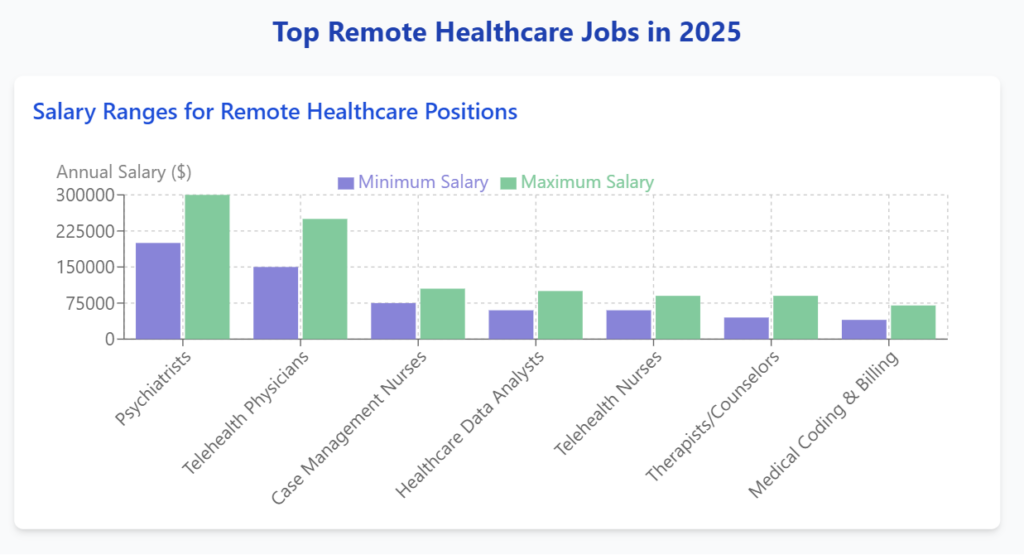Traditionally associated with in-person care, the healthcare industry has experienced a remarkable transformation in recent years.
According to recent data, employment in healthcare occupations is growing faster than average, with approximately 1.9 million job openings annually, according to the Bureau of Labor Statistics. This surge, coupled with increasing demand for virtual medical care, has positioned remote healthcare as one of the top remote career categories.
Let’s explore the most popular remote healthcare jobs in 202 and how you can prepare for these opportunities.

Top Remote Healthcare Careers
1. Telehealth Providers
Average Salary Range: $150,000-$250,000 for physicians; $60,000-$90,000 for nurses
Telehealth providers deliver care through virtual platforms, conducting consultations, making diagnoses, and developing treatment plans. This category includes:
- Telehealth Physicians: Particularly in demand in family medicine, psychiatry, and urgent care
- Telehealth Nurses: Providing virtual triage, patient education, and chronic disease management
- Nurse Practitioners: Offering primary and specialty care independently or in collaboration with physicians
Major employers include Teladoc Health, Amwell, MDLIVE, and PlushCare.
More on Telehealth here: Telehealth Vs. Telemedicine: Knowing The Main Difference
2. Remote Mental Health Professionals
Average Salary Range: $45,000-$90,000 for counselors; $200,000-$300,000 for psychiatrists
Mental health services have seen perhaps the most successful transition to virtual delivery:
- Psychiatrists: Providing diagnosis, therapy, and medication management
- Therapists/Counselors: Conducting therapy sessions via secure video platforms
- Behavioral Health Coaches: Supporting clients with behavioral change strategies
Companies like Talkspace, BetterHelp, Cerebral Care, and Intellect Company are actively hiring in this space.
Mental Health Support Strategies for Healthcare Workers. Read more here!
3. Medical Coding and Billing Specialists
Average Salary Range: $40,000-$70,000
These professionals translate healthcare services into standardized codes for insurance reimbursement and billing purposes. Remote work in this field was common even before the pandemic, making it one of the more established remote healthcare careers.
Key employers include Ciox Health, UnitedHealth Group, and various hospital systems that have moved their revenue cycle operations remote.
4. Case Management Nurses
Average Salary Range: $75,000-$105,000
Remote case managers coordinate care for patients with complex or chronic conditions, ensuring they receive appropriate services and follow their treatment plans. They work closely with insurance companies, healthcare providers, and patients to optimize care delivery.
UnitedHealth Group, Humana, Aetna, and Included Health frequently hire for these positions.
5. Healthcare Data Analysts
Average Salary Range: $60,000-$100,000
These professionals analyze healthcare data to improve patient outcomes, operational efficiency, and cost-effectiveness. Their work is critical for healthcare organizations looking to enhance quality of care while managing resources effectively.
Top employers include Optum, Cerner, Cotiviti, and major hospital systems.

Emerging Remote Healthcare Roles
Several newer roles are gaining popularity in the remote healthcare landscape:
1. Remote Health Coaches
Health coaches work with patients to develop personalized wellness plans, focusing on lifestyle changes such as diet, exercise, and stress management. They provide ongoing support and motivation, complementing traditional medical care.
2. Clinical Research Coordinators
Average Salary Range: $50,000-$85,000
With many clinical trials now involving remote monitoring and data collection, clinical research coordinators can work from home to oversee recruitment, patient monitoring, and data management aspects of research studies.
3. Artificial Intelligence Specialists in Healthcare
Average Salary Range: $100,000-$150,000
These specialists develop algorithms for diagnosis, treatment planning, and healthcare analytics, playing a crucial role in the technological advancement of healthcare delivery.
Skills and Requirements for Remote Healthcare Jobs
Educational Requirements
Most remote healthcare positions require at least the following:
- Relevant degree in healthcare or medical field (varies by position)
- State licensure (especially important for clinical roles)
- Certifications specific to the role
For telehealth positions, additional certifications like Ambulatory Care Nursing Certification (AMB-BC) or Telehealth Facilitator Certificate can give candidates an edge.
Technical Requirements
Remote healthcare professionals need:
- Strong digital literacy
- Experience with telehealth platforms and electronic health records
- Reliable high-speed internet connection
- HIPAA-compliant home office setup
- Proficiency with secure communication tools
Soft Skills
Success in remote healthcare also depends on:
- Exceptional communication abilities
- Strong time management and organization
- Independent decision-making capabilities
- Empathy and patient rapport-building in virtual settings
- Adaptability to new technologies
Benefits of Remote Healthcare Work
Remote healthcare positions offer numerous advantages:
- Work-Life Balance: Flexible scheduling options and elimination of commuting time
- Geographic Freedom: Ability to work from anywhere, sometimes even across state lines with compact licensing
- Reduced Burnout: Less physical strain and exposure to workplace stressors
- Cost Savings: Savings on commuting, work attire, and meals
- Expanded Access to Care: Opportunity to reach underserved populations
According to a recent survey, healthcare professionals with remote options report 15-20% higher job satisfaction compared to those in traditional settings.
Finding Legitimate Remote Healthcare Opportunities
To find quality remote healthcare positions:
- Use specialized job boards like FlexJobs, We Work Remotely, or NurseRemotely.com
- Check career pages of major healthcare companies with established remote programs
- Join professional associations and networking groups in your specialty
- Set up job alerts with specific keywords like “remote RN” or “telehealth physician”
Watch for red flags such as:
- Requests for upfront payments for training or equipment
- Unusually high salaries for entry-level positions
- Use of generic email addresses for company communication
- Lack of professional web presence
Work From Home Healthcare Jobs – A Brief Guide. Read more here!
Preparing for a Remote Healthcare Career
If you’re looking to transition to remote healthcare work:
- Update your resume to highlight relevant remote-friendly skills and technology proficiency
- Obtain relevant certifications in your field that demonstrate remote competency
- Create a proper home office setup that meets HIPAA compliance requirements
- Practice virtual communication skills through online courses or workshops
- Develop a digital portfolio showcasing your telehealth experience and technical abilities
The Future of Remote Healthcare
The remote healthcare industry is projected to continue its growth trajectory. Estimates suggest that remote healthcare positions will increase by 15-20% annually over the next five years.
As technology advances and healthcare delivery models evolve, we can expect even more specialized remote roles to emerge.
The pandemic may have accelerated the adoption of remote healthcare, but its convenience, efficiency, and effectiveness ensure it will remain an integral part of our healthcare system moving forward.
For healthcare professionals seeking flexibility without sacrificing impact, remote work offers the best of both worlds: the ability to make a difference in patients’ lives while enjoying improved work-life balance.
Whether you’re a clinician looking to transition away from bedside care or a healthcare support professional seeking more flexibility, the expanding world of remote healthcare offers promising career pathways for 2025 and beyond.

Managed to snag a bonus using an ok9code promo code! The site’s layout is easy to understand, which is a big plus for me. Let’s see if I can turn that bonus into some serious dough! ok9code
Like the ease of logging into Beta! Fast and secure. Always a plus! If you need quick access to your account, try betanologin. Simple and effective!
7e777…hmm, intriguing. Taking a peek to see what this site brings to the table. Maybe I’ll find my new favorite thing! Check out 7e777 7e777
Alright, tried my luck at hi88bu! Site’s pretty slick. Could use a bit more variety in games, but overall, had a decent time. Worth checking out, mates! hi88bu
Jilibetapplogin is my jam! Easy to login from my phone, games run smooth, zero lag. Give it a try bros, you won’t regret it ! Login here –> jilibetapplogin
I saw lunabetaffiliate advertised somewhere. I don’t know too much about it, but I’m kinda curious, anyone know if its legit? Here’s a link –> lunabetaffiliate